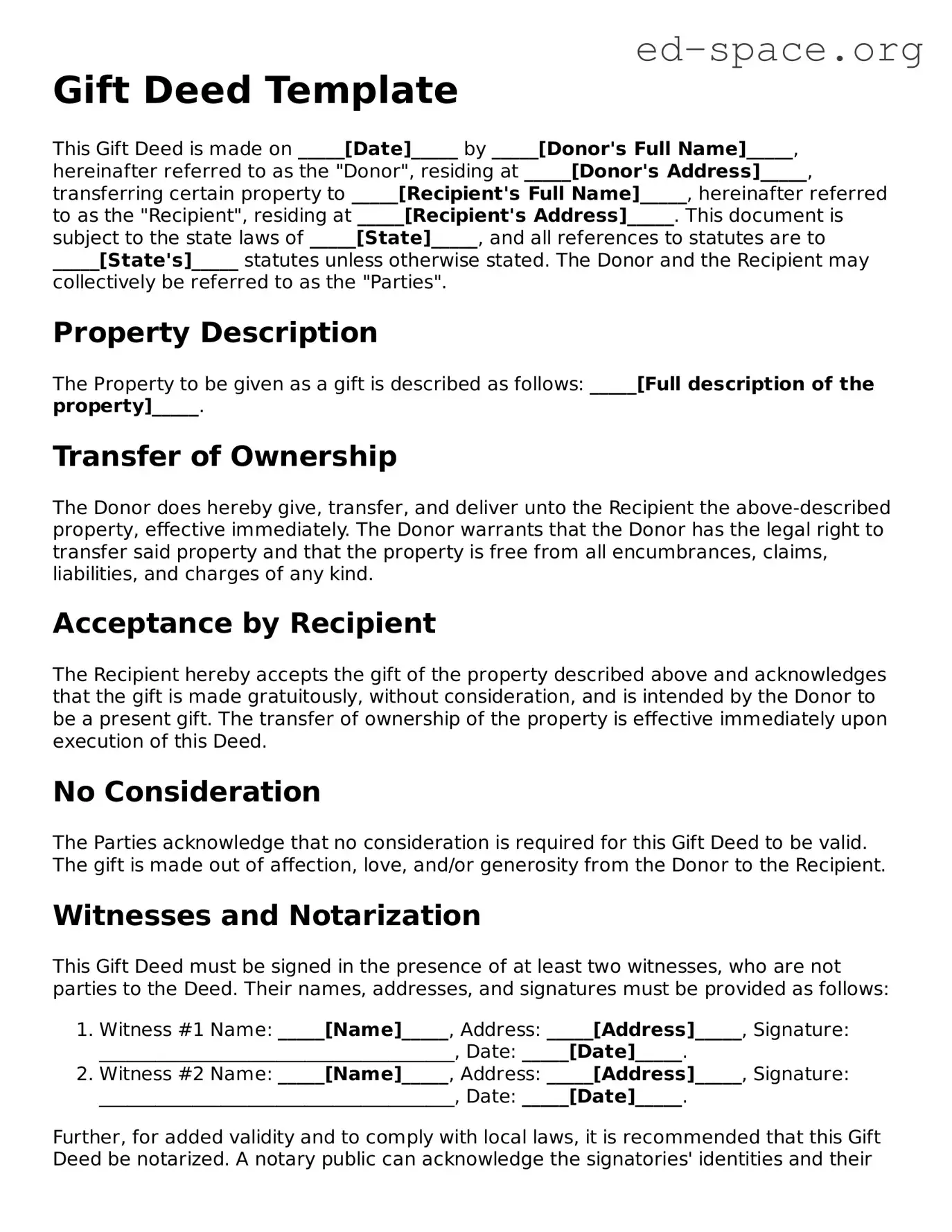Gift Deed Template
This Gift Deed is made on _____[Date]_____ by _____[Donor's Full Name]_____, hereinafter referred to as the "Donor", residing at _____[Donor's Address]_____, transferring certain property to _____[Recipient's Full Name]_____, hereinafter referred to as the "Recipient", residing at _____[Recipient's Address]_____. This document is subject to the state laws of _____[State]_____, and all references to statutes are to _____[State's]_____ statutes unless otherwise stated. The Donor and the Recipient may collectively be referred to as the "Parties".
Property Description
The Property to be given as a gift is described as follows: _____[Full description of the property]_____.
Transfer of Ownership
The Donor does hereby give, transfer, and deliver unto the Recipient the above-described property, effective immediately. The Donor warrants that the Donor has the legal right to transfer said property and that the property is free from all encumbrances, claims, liabilities, and charges of any kind.
Acceptance by Recipient
The Recipient hereby accepts the gift of the property described above and acknowledges that the gift is made gratuitously, without consideration, and is intended by the Donor to be a present gift. The transfer of ownership of the property is effective immediately upon execution of this Deed.
No Consideration
The Parties acknowledge that no consideration is required for this Gift Deed to be valid. The gift is made out of affection, love, and/or generosity from the Donor to the Recipient.
Witnesses and Notarization
This Gift Deed must be signed in the presence of at least two witnesses, who are not parties to the Deed. Their names, addresses, and signatures must be provided as follows:
- Witness #1 Name: _____[Name]_____, Address: _____[Address]_____, Signature: ______________________________________, Date: _____[Date]_____.
- Witness #2 Name: _____[Name]_____, Address: _____[Address]_____, Signature: ______________________________________, Date: _____[Date]_____.
Further, for added validity and to comply with local laws, it is recommended that this Gift Deed be notarized. A notary public can acknowledge the signatories' identities and their voluntary execution of the deed.
State Specific Provisions
If the property being transferred is real estate, and the transfer is taking place in a state with specific requirements for the transfer of real property, those state-specific requirements must be observed. Consult local laws and regulations for any additional steps or documentation required.
Execution
In witness whereof, the Parties have executed this Gift Deed on the date first written above.
Donor's Signature: ______________________________________
Recipient's Signature: ______________________________________
Acknowledgment by Notary Public
This section is for the Notary Public to complete as evidence of witnessing the signatures on the Gift Deed.
State of _____[State]_____
County of _____[County]_____
On _____[Date]_____, before me, _____[Notary's Name]_____, a notary public, personally appeared _____[Names of Signatories]_____, known to me (or satisfactorily proven) to be the persons whose names are subscribed to the within instrument and acknowledged that they executed the same for the purposes therein contained.
In witness whereof, I have hereunto set my hand and official seal.
Notary Public's Signature: ______________________________________
My Commission Expires: _____[Expiration Date]_____
